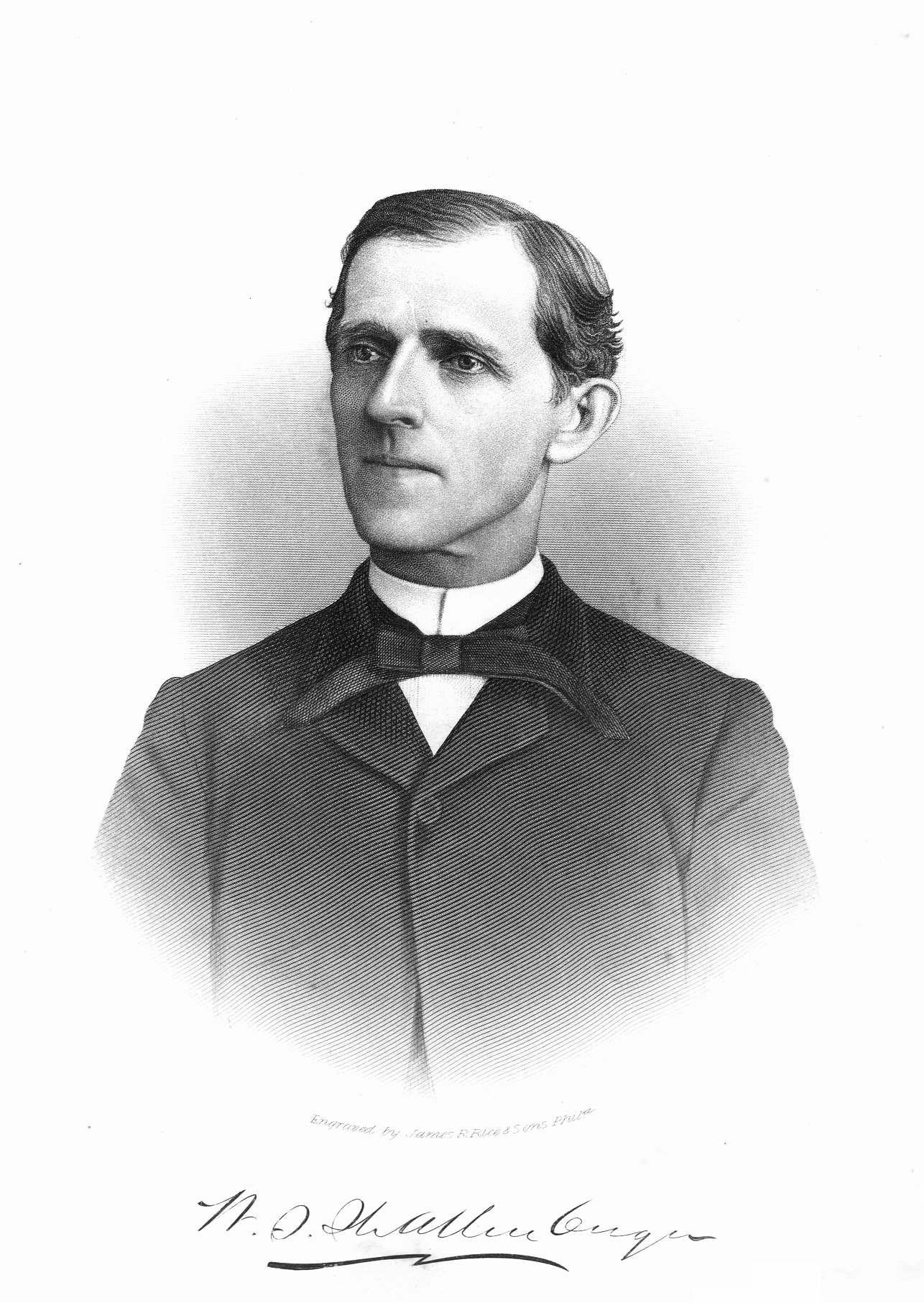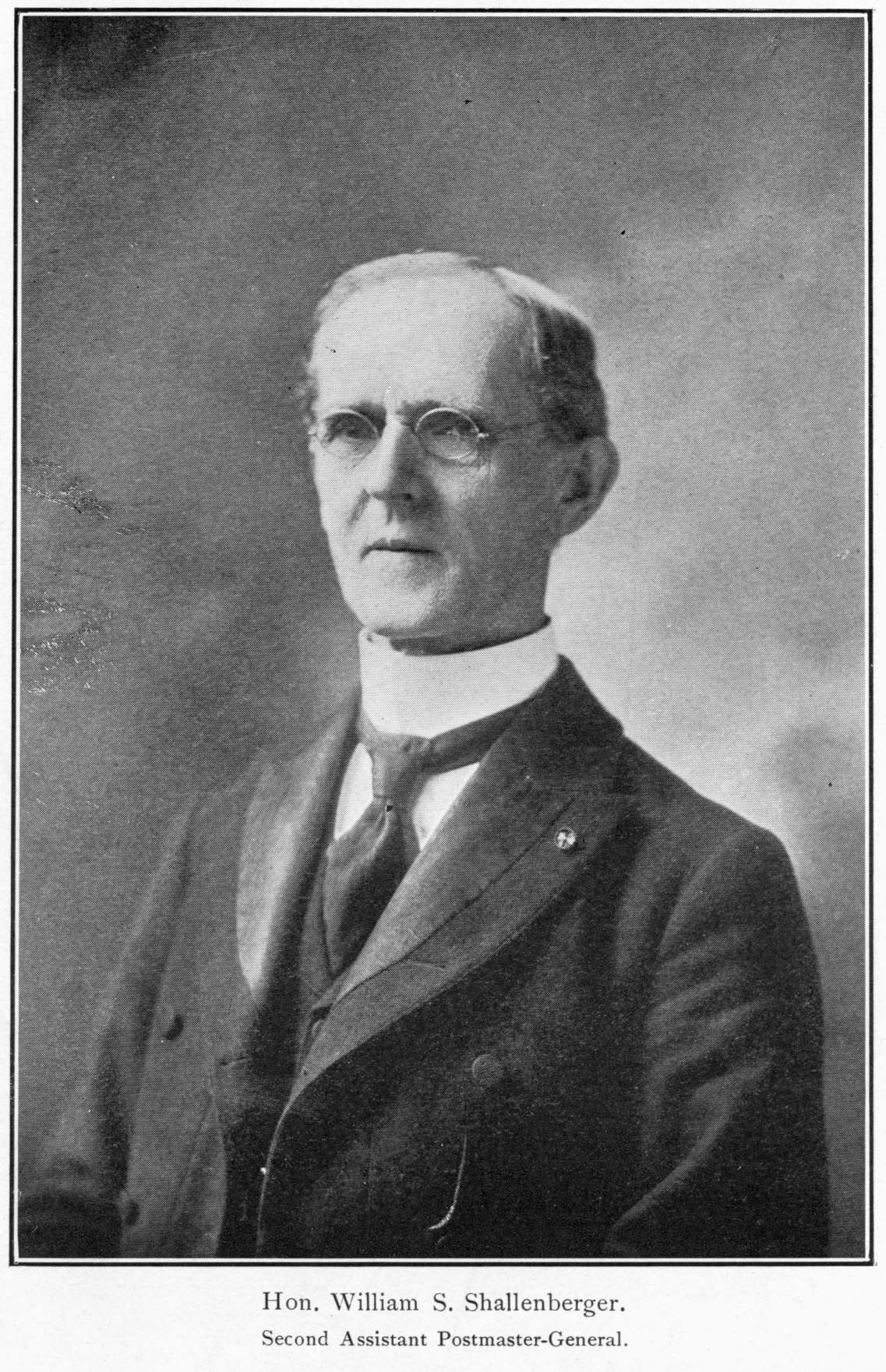Husband Gen. William S. Shallenberger 1 2 3 4

Born: 24 Nov 1839 - Mt. Pleasant, Westmoreland Co, PA 1 2 3
Christened:
Died:
Buried:
Father: Abraham Shallenberger (1797-1868) 1 4 5
Mother: Rachel Newmyer (1801-1870) 4 5 6
Marriage: 1 Dec 1864 7 8

• Additional Image: William S. Shallenberger.
Wife Josephine Power 7 8
AKA: Josephine Powers 3
Born:
Christened:
Died:
Buried:
Father: Gen. Thomas J. Power (1808- ) 8 9
Mother: Mary Ann Johnson ( - ) 9
Children
1 M Thomas P. Shallenberger 7
Born:
Christened:
Died: Bef 1888
Buried:
2 F Laura Shallenberger 7
Born:
Christened:
Died:
Buried:
3 M Francis W. Shallenberger 7
Born:
Christened:
Died: Bef 1888
Buried:
4 F Elizabeth Shallenberger 3
Born:
Christened:
Died:
Buried:
Spouse: Frederick M. Smith ( - ) 3
5 F Mary Shallenberger 3
Born:
Christened:
Died:
Buried:
Spouse: Harper McClerg ( - ) 3
6 M William Shallenberger 3
Born:
Christened:
Died:
Buried:
7 F Josephine Shallenberger 3
Born:
Christened:
Died:
Buried:
Spouse: Rev. Paul Sperry ( - ) 3
General Notes: Husband - Gen. William S. Shallenberger
Studious from his earliest years, he engaged in teaching after the completion of his education, and was also interested in the wholesale drug business at the time of the outbreak of the Civil War. He offered his services to his country, was adjutant in the One Hundred and Fortieth Regiment, and was wounded three times; he was a member of the staff of Colonel Roberts, and was actively engaged at Chancellorsville, Gettysburg, Battle of the Wilderness, and numerous minor skirmishes. At the close of the war he became cashier of the First National Bank of Rochester, Pennsylvania, a position he held for some years; he served as chairman of the county committee, and was elected to congress from his district for three consecutive terms; he was appointed second assistant postmaster general under McKinley, and served for ten consecutive years, after which he resigned. He later became assistant to Dr. Green, in the Baptist Church, of Washington, D. C., superintendent of the Sunday school, and leader and teacher of the Vaughn Bible Class of the Calvary Baptist Church, one of the most noted Bible classes in the United States. [GPHWP, 128]
His early years were spent at the public school, and in learning the trade of his father, who was a saddle and harness-maker. In October, 1855, when not quite sixteen years of age, he was elected teacher of one of the district schools of Washington County, Pennsylvania, and taught during the following winter. He removed with his father's family to Beaver County, Pennsylvania, in the spring of 1856, and thereafter resided in Rochester. He attended the University at Lewisburg, Union County, Pennsylvania, during a portion of two years, but was compelled to leave before graduating on account of failing health. He later received the honorary degree of A. M. from this university. In 1862 he enlisted in the army. We quote from material before us, a few leading estimates of the public services and personal characteristics of Mr. Shallenberger. His army record we find well summarized in the following paper prepared by the surgeon of his regiment, afterward division surgeon, Dr. I. Wilson Wishart, and signed by all the officers of the regiment.
HOSPITAL 1ST DIV. 2D. CORP A. OF P. Sept. 17, 1864.
Adjutant Shallenberger, in response to the call for volunteers in 1862, enlisted as a private, and contributed largely by his influence and personal efforts to the formation of the 140th Regiment, P. V. Upon the organization of the regiment he was appointed adjutant, and has served in that capacity until the present time. At the battle of Chancellorsville, the first in which the regiment was engaged, he received a slight wound, which, however, did not require him to leave the field. At the battle of Gettysburg he was severely wounded in the leg, but rejoined the regiment at Morrisville, Virginia, before his wound was healed, and participated with his comrades in all the marches and fighting of the fall campaign.
Just recovering from a severe attack of illness he started upon the campaign of 1864, when scarcely able to keep the saddle; was in the battle of the Wilderness and at the fight of Corbin's Bridge, near Todd's tavern, May 8th; received a very severe wound in the thigh, from which he is now suffering.
Adjutant Shallenberger has remarkable business capacity. Having full confidence in his ability to discharge the duties of paymaster to the satisfaction of the department, I very cordially recommend his appointment.
(SGD.)
Surg. 140th Pa. Vol.
In forwarding this paper Gen. Nelson A. Miles says: "Adjutant Shallenberger has served under my command, and I know him to be a most reliable, efficient and worthy officer." Gen. Hancock adds: "This young officer made, I think, more recruits for us in Western Pennsylvania in the winter of 1863-64 than probably any other officer; but aside from this he is a gallant young officer, richly deserving promotion."
The last wound compelled the retirement of Adjutant Shallenberger from active service. After the lapse of two years the ball was extracted from the thigh, and the wound healed. From that time until 1876, when he was elected to his first political office, that of Representative in Congress, Mr. Shallenberger was engaged in mercantile pursuits. He represented in Congress the 24th District of Pennsylvania, composed of Washington, Beaver and Lawrence counties; was re-elected in 1878, and again in 1880. In a Washington City paper published in June, 1880, the following estimate of his official character appears: "Mr. Shallenberger is scrupulously attentive to his public duties: rarely out of his seat in the House; faithful in committee work; extremely courteous and genial in his relations with his colleagues; always practical, and never obtrusive or out of place in his conduct of legislation. He has had remarkable success in securing the favorable action of Congress upon bills which he has had in charge. He has reason to feel proud of the endorsement recently given him by his constituents. For the first time in nearly forty years a renomination for a third term has been made by his district, and by the most flattering popular vote of all the counties at their primaries."
During his third term he served as chairman of the Committee on Public Buildings and Grounds, but devoted much time to the study of the tariff, a subject of controlling interest to his constituents. His speech of April 15, 1882, was widely circulated and highly praised. General J. K. Moorhead, of Pittsburgh, himself an able defender of the tariff for ten years in Congress, acknowledged the receipt of a copy of the speech under date of May 1, 1882, as follows: "Dear Sir:-I thank you a thousand times for your very able tariff speech, which I have just read. It should be spread over the United States by thousands; and it places you at the very head of protectionists. I have just finished reading it, and as my time for leaving my office has arrived, I can say no more, but could not leave until I had said this."
Hon. Wm. Lawrence, of Ohio, then first comptroller of the treasury, wrote under date of Dec. 18, 1882, in regard to this speech, as follows: "Prior to the last political campaign, I had occasion to prepare some matter to enable me to make speeches in Ohio, and I procured a copy of your speech, which I read and studied with great care. I congratulate you and your constituents on the excellence of your speech. It has a vast fund of information compressed in comparatively small space, and is one of the most able and exhaustive speeches upon the subject which I have read."
After his retirement from Congress, Mr. Shallenberger was engaged in the banking business in Rochester, Beaver County, Pennsylvania, and as treasurer of various corporations.
He was a member of the Baptist church, of Rochester, and was a deacon from its organization.
He was educated in the public schools, Mount Pleasant Academy, and the University of Lewisburg, now Bucknell University. Early in the Civil War he enlisted in the 140th Pennsylvania Volunteers, and served under Generals Miles and Hancock in the First Division, Second Army Corps. He was several times wounded, the last wound being in the thigh and caused by a minie ball, which could not be removed for more than two years, necessitating his discharge in October, 1864. From that time until 1876, when he was elected Representative in Congress, Mr. Shallenberger was engaged in mercantile business. He represented, in Congress, the twenty-fourth district of Pennsylvania, composed of Washington, Beaver, and Lawrence counties, was re-elected in 1878, and again in 1880. During his third term he was chairman of the committee on public grounds and buildings, but devoted most of his time to the study of the tariff. His speech on April 15, 1882, was widely circulated.
Upon his retirement from Congress, Mr. Shallenberger was engaged as cashier in the First National Bank of Rochester. He continued his connection with this bank and was treasurer of the Rochester Tumbler Works until the inauguration of President McKinley. He then resigned in order to accept the position of Second Assistant Postmaster-General, tendered him by the President, who was a personal friend, and who, during the six years spent by Mr. Shallenberger in Congress, had been closely associated with him in many ways. Both entered the Forty-fifth Congress and represented contiguous districts\emdash President McKinley in eastern Ohio, and Mr. Shallenberger in western Pennsylvania. The interests of their constituents were so nearly identical, and their own views on political and social questions so much alike, that they became warm friends, and it was due to this that President McKinley conferred this appointment upon him. The bureau over which Mr. Shallenberger presided had jurisdiction over all transportation of mails, either by steam railways, steamboats, electric cars, or what was known as the Star Route Service, reaching every village and hamlet of the country. This included all foreign transportation, to and from the nation's new possessions.